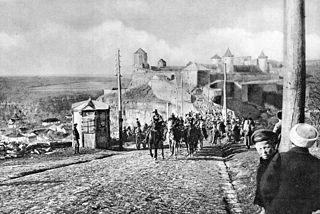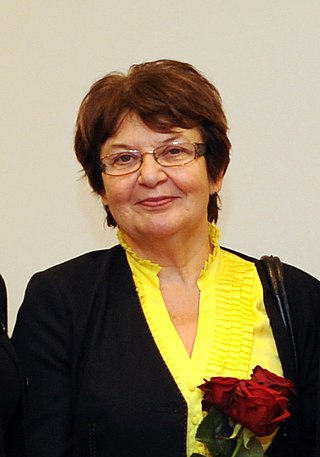
The Russian Civil War was a multi-party civil war in the former Russian Empire sparked by the overthrowing of the liberal-democratic Russian Provisional Government in the October Revolution, as many factions vied to determine Russia's political future. It resulted in the formation of the Russian Socialist Federative Soviet Republic and later the Soviet Union in most of its territory. Its finale marked the end of the Russian Revolution, which was one of the key events of the 20th century.

The Treaty of Brest-Litovsk was a separate peace treaty signed on 3 March 1918 between Soviet Russia and the Central Powers, by which Russia withdrew from World War I. The treaty, which followed months of negotiations after the armistice on the Eastern Front in December 1917, was signed at Brest-Litovsk.

Gottlieb von Jagow was a German diplomat. He served as the State Secretary of the German Foreign Office between January 1913 and 1916.

Hardi Volmer is an Estonian film director, puppet theatre set decorator and musician. Volmer is the singer in the Estonian punk rock band Singer Vinger.

Cinema of Estonia is the film industry of the Republic of Estonia. The motion pictures have won international awards and each year new Estonian films are seen at film festivals around the globe.
Firewater is Hardi Volmer's history-based thriller released in 1994.
Aleksander Eduard Kesküla was an Estonian politician and revolutionary.

Ilmar Raag is an Estonian media executive, actor, screenwriter and film director, best known for his socio-critical film The Class. He was CEO of Estonian Television from 2002 to 2005. He is a well known columnist in many prestigious Estonian newspapers. He has written many scripts and directed critically acclaimed films, notably August 1991 and The Class.

The following is an alphabetical list of articles related to the Republic of Estonia.

The Operation Faustschlag, also known as the Eleven Days' War, was a Central Powers offensive in World War I. It was the last major offensive on the Eastern Front.

Helene Vannari was an Estonian stage, radio, television and film actress.
Jaan Rekkor is an Estonian stage, film and television actor.

Andres Puustusmaa is an Estonian film director, actor, screenwriter, professor, and photographer who began his career in the early 1990s. He has worked extensively in his native Estonia, as well as in Russia.
Indrek Taalmaa is an Estonian stage, television, voice, film actor, and theatre director whose career began in the early 1990s.

Eero Spriit, is an Estonian actor, theatre producer and director, and film and television producer. Spriit's career as an actor began in the early 1970s.
Central Powers intervention in the Russian Civil War consisted of a series of multi-national military expeditions starting in 1918. This intervention was picking up from the Eastern Front against the newly set up Russian Republic. The main goals of the intervention were to maintain the territories received in the Treaty of Brest-Litovsk, prevent a re-establishment of the Eastern Front, and administer new conquered territories. After the defeat of the Central Powers, many armies that stayed mostly helped the Russian White Guard eradicate communists in the Baltics until their eventual withdrawal and defeat. In addition, pro-German factions fought against the newly independent Baltic states until their defeat by the Baltic States, backed by the victorious Allies.
Jan Uuspõld läheb Tartusse is a 2007 Estonian comedy film directed by Andres Maimik and Rain Tolk.

Linnar Priimägi is an Estonian art historian, journalist, literary critic, poet and actor.

Jüri Krjukov was an Estonian actor.













